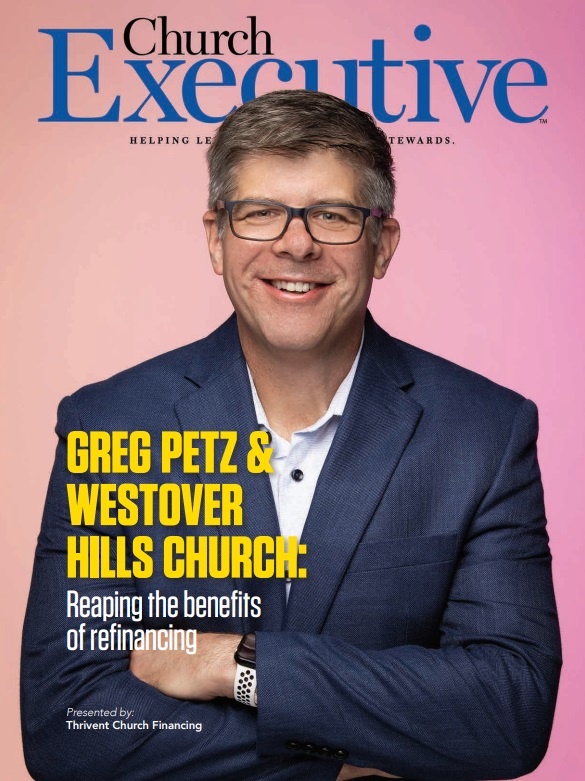
At one of the fastest-growing churches in America, a favorable refinancing agreement is essential for propelling ministry forward.
By RaeAnn Slaybaugh
When Greg Petz and his wife, Donna, moved to San Antonio in 1996, they found their church home — Westover Hills — even before their physical home.
The Petzes’ dedication to Westover grew along with the church itself — at the time, it welcomed about 500 worshippers; today it’s No. 58 on the list of the 100 fastest-growing churches in the country, as ranked by Outreach.
So, when Founding and Lead Pastor Jim Rion offered Petz the CFO position about 11 years ago, it was clear that it was time to step away from a career in corporate finance and into church work.
 Petz, in his role as controller for a multi-billion-dollar auto manufacturing company, commanded a $900-million operation. Though the duties differed between these corporate and church roles, Pastor Rion nevertheless knew to look for someone with this level of experience — and perhaps more importantly, a familiarity with and affinity for Westover — to help accommodate the church’s rapid growth.
Petz, in his role as controller for a multi-billion-dollar auto manufacturing company, commanded a $900-million operation. Though the duties differed between these corporate and church roles, Pastor Rion nevertheless knew to look for someone with this level of experience — and perhaps more importantly, a familiarity with and affinity for Westover — to help accommodate the church’s rapid growth.
“Frankly, I was also looking at a season in transition,” Petz recalls. “Granted, I never thought I would be the CFO of a church. But here I am today, still in the role.”
“It’s a humbling experience, but I feel like I’m called to do this at this season of my life,” he adds. “I’m involved in so many different areas of strategic thinking and planning with our team; it really just brings me to life to be working in the ministry.”
A focus on smart debt management
Key to this planning and expansion has been undertaking substantial building programs and, in doing so, acquiring some debt. As a result, Petz and his team sought to refinance the church’s debt in 2011.
Westover was in a 10-year interest rate swap agreement with its lending institution at the time, with five-plus years remaining on the note. As Petz explains, part of the difficulty of an interest rate swap arrangement is “trying to explain it” — in particular, to a board of directors who might not have financial backgrounds like his own.
 “Here’s how I put it: we, as a church, would prefer a fixed interest rate for as long as we can get it,” Petz says. Of course, this is because fixed rates provide predictable payments, whereas variable interest rates cannot.
“Here’s how I put it: we, as a church, would prefer a fixed interest rate for as long as we can get it,” Petz says. Of course, this is because fixed rates provide predictable payments, whereas variable interest rates cannot.
“But banks want variable rates, and they don’t want to give long-term rates,” he says. “So, they offer these interest rate swaps that ‘sit in the middle’ between the bank and the church as an intermediary.” If interest rates rise to a certain point, the church sees a gain on its interest rate swap. If interest rates fall, the church sees a loss. “All this is to say that we were seeing wild fluctuations in our interest rate swap,” Petz concludes.
He and his team aimed to take advantage of the lower-interest-rate environment in another 10-year fixed-rate note, but without using an interest rate swap.
So, when Westover leadership began to look for a financial partner, it sought a credible lending institution that would not only have strong financial capacity but also operate as a true church lender that understands how churches work. Thrivent Church Financing offered a refinance package that ideally suited the church.
Westover was seeking a new lending partner for several reasons. Petz says he wanted to make sure the church partnered with a lender that could not only provide competitive loan terms and rates, but also one that understood a church’s unique operating model and offered flexibility regarding future requests and potential sale of property. Thrivent’s demonstrated 115-year history of serving churches, combined with their cost saving proposal and flexible loan structure that addressed the church’s future plans, all pointed to a lender that understood churches. “Most compelling, was Thrivent’s ability to offer a simple long-term fixed rate fully amortizing loan with no balloon, thereby eliminating the need to incur renewal costs at a future date,” Petz adds.
Nuts-and-bolts, dollars-and-cents
As noted above, Westover’s previous long-term debt was coupled with an interest rate swap agreement, which — based on the prevailing market rates at the time — was in a significantly unfavorable position. As such, Thrivent was challenged to provide a refinance package that not only secured a favorable payback, but also offset penalties to exit the swap agreement and secured long-term debt refinancing at a lower rate.
“They put together an aggressive package that essentially lowered our interest rate significantly in a climate where interest rates were at all-time lows,” Petz says. “[Thrivent] came in with a 10-year fixed rate with no interest rate swap, just a pure fixed rate at a rate that was substantially lower than our previous rate.”
But it wasn’t that simple.
“We weren’t going to make a poor financial decision just to get out of the swap,” Petz explains, adding that it’s impossible to simply “exit” such an agreement.
“You’re literally tied into it,” he emphasizes. “The only way to exit it was to pay it out, since the church was sitting at a significant loss based on the interest rate at the time.”
However, the savings over the 10-year refinance period offered by Thrivent was substantial — enough for the church to not only exit the swap but also realize above-and-beyond savings over the remaining life of the note.

Additionally, Petz says he and his team found the refinancing process to be quick and streamlined, with an efficient underwriting and closing process.
“Thrivent approached us in June 2021, and we had an offer on the table pretty quickly after that,” Petz recalls. “By September, we had taken a written offer to our board, done our due diligence, worked through the numbers, went back to our board, gotten approval, and closed on the loan.
In terms of required documentation, Petz says the checklist was “pretty cut and dried.”
“I think there were 10, maybe 12 items on it, all of them pretty readily available,” he recalls. “Thrivent was quick to assess the risk and determine exactly what they needed from us.”
More money, more ministry

Westover leaders expect to realize savings between $500,000 and $750,000 as a result of refinancing the church’s debt. These hard-dollar savings will enable increased ministry impact in the San Antonio community — essential because, as Petz explains, the church believes the best way to reach the community is to engage them where they’re at.
For example, Westover offers a thriving community sports program, Westover Sports, which provides organized sports leagues for youth and adults. The current youth soccer league has almost 500 athletes ranging from ages 3 to 12. Although children who attend the church participate in the league, Westover Sports has set an internal marketing target to reach between 60% and 70% non-Westover participants. Through relationships developed with Westover Sports coaches — who are all church members — Westover has realized growth by families taking the next step from the sports program to a church service.
Another effective ministry initiative is the Westover Field of Lights, a walk-through Christmas light display with more than 300,000 Christmas lights, music, food, and other family-friendly activities which share the story of Jesus’ birth.
Launched last year, about 15,000 people attended the inaugural event; all were invited to attend Christmas services and other upcoming church events. More than 200 new families attended a Westover service during the 2021 Christmas season.
Indeed, post-COVID, Westover has experienced a resurgence of in-person attendance, with many new first-time family visitors accounting for the growth. Amazingly, about 4,500 people now attend services every week.
Other popular initiatives include an annual Easter Egg Hunt, local school partnerships, and the Westover Cares program, which partners with other San Antonio outreach and non-profit organizations to meet community needs.
“Now we’re trying to go out in our community more and do even more,” Petz says. “And like any ministry, the fewer dollars you can spend on financing or fixed costs that really don’t move your ministry forward, the better.”
An end in sight
The ministry benefits of refinancing are obvious; perhaps best of all, though, Westover will be debt-free and the end of the 10-year note.
Retiring debt has been on the leadership’s radar since well before Petz even joined the church staff as CFO. “Being debt-free has always been part of our leadership’s dream,” he points out. “But it’s hard to do as you keep growing and keep building buildings.”
QUICK FACTS ABOUT
WESTOVER HILLS CHURCH:
Year established: 1986
Number of staff — full- and part-time: 40 / 20
Combined weekly attendance: 4,500 — 3,700 in person / 800 online
2022 budget: $8.5 million
Moreover, Petz says, the median household income within a five-mile radius is $60,000.
“So, we don’t have million-dollar donors who come to our services,” he points out. “Instead, we count on many people participating in order to advance our mission.”
Having spent nearly 40 years at the pastorship helm of Westover, Pastor Jim Rion would particularly like to see the debt retired before he retires — something which is on the imminent horizon.
“It’s one of his heart goals not to leave the next lead pastor in debt,” Petz explains. And while that’s unlikely to be realized, Petz says the church is in a healthy place, financially, and might even be able to pay off its 10-year payback early.
“Really, the goal is to be debt-free in six to seven years, not wait the whole 10 years,” he explains. “We’re making additional principal payments to be able to do that and use those funds for more ministry.”


